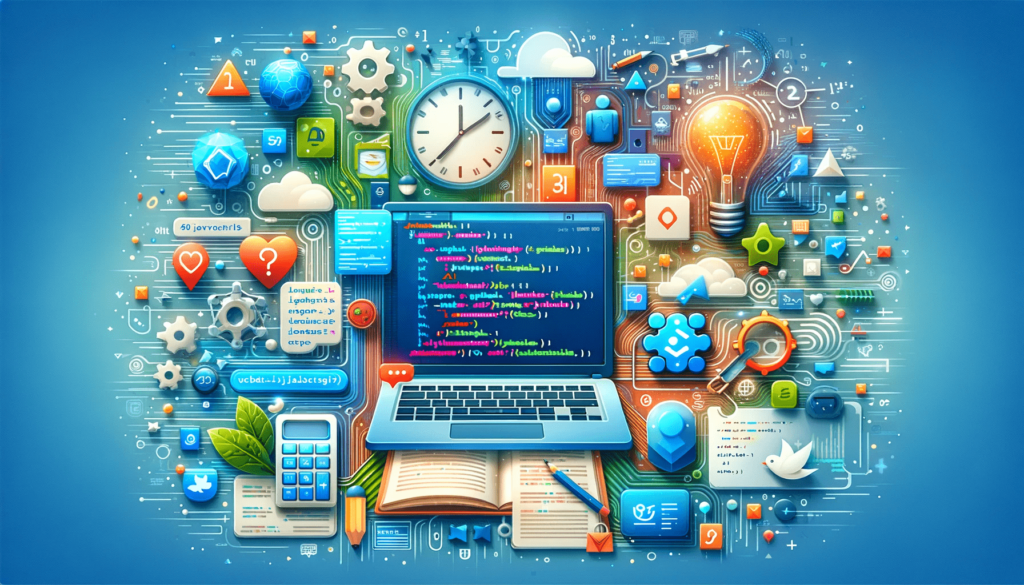Are you ready to dive into the world of programming? Here’s how to start learning programming and lay the foundation for your coding adventure.
Kickstarting your journey in learning programming involves several important steps. First, you need to choose a programming language that matches your interests and goals. There are many options, such as Python, JavaScript, Java, C++, and Ruby. Once you have chosen a language, you can find a learning resource that suits your learning style and budget. Online platforms like Udemy, Coursera, edX, and Codecademy offer both free and paid programming courses. It is also recommended to learn the basics of programming, including data types, variables, functions, loops, and conditionals. Building projects is a crucial part of the learning process as it allows you to apply the concepts you’ve learned and gain real-world experience. Joining a community of programmers can provide you with support, inspiration, and motivation. Online communities like Reddit’s /r/learnprogramming, Stack Overflow, and GitHub are great places to connect with like-minded individuals. Attending programming events, such as hackathons and conferences, can provide valuable networking opportunities and expose you to new technologies and ideas. Finally, the most important step in learning programming is to practice consistently. Set aside time each day to work on programming projects and gradually improve your skills.
Key Takeaways:
- Choose a programming language that matches your interests and goals.
- Find a learning resource that suits your learning style and budget.
- Learn the basics of programming, including data types, variables, functions, loops, and conditionals.
- Build projects to apply the concepts and gain real-world experience.
- Join a community of programmers for support, inspiration, and networking.
Choosing the Right Programming Language
With a multitude of programming languages available, it’s important to select one that aligns with your interests and future aspirations. Let’s explore some popular options:
Python
Python is often recommended for beginners due to its simple syntax and readability. It is versatile and widely used in various domains like web development, data analysis, and artificial intelligence.
JavaScript
JavaScript is the language of the web and is essential for front-end web development. It allows you to add interactivity and dynamic content to websites, making it a valuable skill to have.
Java
Java is a widely used language in enterprise environments and is known for its robustness and compatibility. It is used for building desktop applications, Android apps, and large-scale systems.
C++
C++ is a powerful language often used for system programming, game development, and building performance-critical applications. It provides more control over hardware resources and is considered a foundational language.
Ruby
Ruby is known for its elegant syntax and focus on developer productivity. It is commonly used for web development, particularly with the Ruby on Rails framework, which provides a productive and intuitive development environment.
Remember, the programming language you choose will depend on your specific goals and interests. Consider the domain you want to work in, the projects you want to create, and the resources available for learning and support.
| Language | Advantages |
|---|---|
| Python | Simple syntax, versatility |
| JavaScript | Essential for web development |
| Java | Robust, widely used in enterprise |
| C++ | Powerful, control over hardware resources |
| Ruby | Elegant syntax, productive development environment |
With this information, you can make an informed decision about which programming language to pursue. Remember, learning a programming language is just the first step towards becoming a proficient programmer. Stay curious, keep practicing, and explore the vast resources available to beginners. Happy coding!
Finding the Right Learning Resource
Now that you have chosen a programming language, it’s time to find a learning resource that will guide you on your coding journey. Fortunately, there are a plethora of online coding courses, beginner-friendly programming guides, and tutorials specifically designed for beginners.
One option is to explore online platforms like Udemy, Coursera, edX, and Codecademy. These platforms offer a wide range of programming courses, both free and paid, covering various languages and topics. You can browse through their extensive catalogs and choose the course that aligns with your learning style and budget.
If you prefer a more interactive learning experience, you may want to consider joining coding bootcamps or coding schools. These programs provide hands-on training and mentorship, allowing you to learn programming in a structured and supportive environment.
Online Coding Courses
| Platform | Course Options |
|---|---|
| Udemy | Wide variety of programming courses, from beginner to advanced levels |
| Coursera | University-level programming courses with verified certificates |
| edX | Collaboration between universities offering programming courses |
| Codecademy | Interactive coding lessons and projects |
Remember that everyone learns differently, so it’s essential to find a resource that suits your preferred learning style. Some people may prefer video tutorials, while others may find written guides more helpful. Additionally, consider joining online communities like Reddit’s /r/learnprogramming, Stack Overflow, and GitHub, where you can connect with like-minded individuals, ask questions, and share your progress. These communities can be invaluable sources of support, inspiration, and motivation on your coding journey.
Ultimately, finding the right learning resource is crucial for your success as a beginner programmer. Take your time to research and explore various options, considering factors such as content quality, instructor expertise, and user reviews. With the right resource in hand, you’ll be well-equipped to dive into coding and start your journey towards becoming a skilled programmer.
Mastering the Basics of Programming
Before diving into more complex projects, it’s important to grasp the fundamental concepts of programming. Understanding the coding basics will provide you with a solid foundation and help you tackle more advanced challenges with confidence. Let’s explore some key concepts that every beginner programmer should know.
Data Types
In programming, data types define the characteristics and behavior of different values. Common data types include integers, floating-point numbers, strings, booleans, and arrays. Each data type has its own set of operations and can be used to perform specific tasks. For example, integers are used for numeric calculations, while strings are used to store and manipulate text.
It’s essential to understand how to declare variables and assign values to them based on their respective data types. This knowledge will allow you to manipulate data effectively and perform operations based on specific requirements.
Functions, Loops, and Conditionals
Functions, loops, and conditionals are essential building blocks in programming. Functions are blocks of reusable code that perform specific tasks. By breaking down your program into smaller functions, you can make it more modular and easier to understand.
Loops allow you to repeat a block of code multiple times, while conditionals enable you to make decisions based on certain conditions. By using loops and conditionals effectively, you can control the flow of your program and make it more interactive and dynamic.
Building a Table
| Function | Definition |
|---|---|
| Data Types | Define the characteristics and behavior of different values. |
| Functions | Blocks of reusable code that perform specific tasks. |
| Loops | Repeat a block of code multiple times. |
| Conditionals | Make decisions based on certain conditions. |
By mastering these basics of programming, you will have a strong foundation to build upon. Practice implementing these concepts in your coding projects, and continue to learn and explore new ideas. Consistent practice and a curious mindset will lead you to become a proficient programmer in no time!
Building Projects and Joining a Community
Building projects and connecting with fellow programmers are essential steps in your programming journey, helping you grow and learn from real-world experiences. Applying the concepts you’ve learned in a hands-on way is an effective way to solidify your skills and gain practical knowledge. By working on projects, you will encounter challenges and problem-solving opportunities that will further enhance your understanding of programming principles.
There are various programming learning pathways you can explore when building projects. One approach is to start with small projects that gradually increase in complexity. This allows you to gradually tackle more advanced concepts and build confidence in your abilities. Additionally, you can find beginner-friendly programming guides and tutorials online that provide step-by-step instructions for creating projects.
A great way to find inspiration and support is by joining a community of programmers. Online communities like Reddit’s /r/learnprogramming, Stack Overflow, and GitHub offer platforms for connecting with like-minded individuals, asking questions, and sharing knowledge. These communities can provide valuable insights, guidance, and motivation as you navigate through your programming journey.
Attending Programming Events
In addition to online communities, attending programming events is another excellent way to connect with the programming community. Hackathons, conferences, and workshops provide opportunities to meet fellow programmers, network with industry professionals, and gain exposure to new technologies and ideas. These events often feature talks and presentations by experienced developers, allowing you to learn from their expertise and gain valuable insights into trends and best practices.
By engaging with the programming community and working on projects, you will continue to sharpen your skills and knowledge. Remember, building projects and joining a community are vital steps in your programming journey, providing you with the tools and support needed to succeed.
| Benefits of Building Projects and Joining a Community | Benefits of Attending Programming Events |
|---|---|
|
|
Building projects, joining a community, and attending programming events are key ingredients for success in your programming journey. By actively participating in these activities, you will grow not only as a programmer but also as a problem solver and collaborator.
Consistent Practice and Continuous Improvement
Congratulations on making it this far! To truly excel in programming, consistent practice and a commitment to continuous improvement are key. As you continue on your programming journey, here are some tips to help you stay on track and enhance your skills.
1. Set aside dedicated time for coding: Establish a regular schedule for coding sessions, whether it’s daily, a few times a week, or on weekends. Consistency is crucial in developing your programming abilities. Treat coding practice as an essential part of your routine, just like any other skill you want to master.
2. Challenge yourself with small projects: Building small projects is an effective way to reinforce what you’ve learned and explore different aspects of programming. Start with simple tasks and gradually increase the complexity as you gain confidence. This will push you to think critically and problem-solve, contributing to your growth as a programmer.
3. Take advantage of online resources: The internet is a treasure trove of programming resources. Explore coding websites, forums, and tutorials to expand your knowledge and learn from experienced programmers. Websites like GitHub, Stack Overflow, and coding communities on Reddit offer valuable insights, tips, and solutions to common programming challenges.
Table: Programming Resources for Beginners
| Resource | Description |
|---|---|
| Udemy | An online learning platform with a wide range of programming courses for beginners. |
| Coursera | Provides beginner-friendly programming courses from top universities and institutions. |
| edX | Offers a variety of programming courses, including some from renowned universities. |
| Codecademy | A platform that focuses on interactive programming tutorials for beginners. |
4. Collaborate with others: Joining a community of programmers can greatly enhance your learning experience. Engage in discussions, ask questions, and contribute your knowledge. Collaborating with others will expose you to different perspectives and approaches, helping you broaden your understanding of programming concepts.
Remember, consistent practice and continuous improvement are the keys to becoming a proficient programmer. By setting regular coding sessions, taking on small projects, utilizing online resources, and engaging with the programming community, you will continue to grow and thrive in your programming journey.
Conclusion
As you embark on your programming adventure, keep in mind that learning programming is a continuous process, and with dedication and persistence, you will achieve your goals.
Kickstarting your journey in learning programming involves several important steps. First, you need to choose a programming language that matches your interests and goals. There are many options, such as Python, JavaScript, Java, C++, and Ruby. Once you have chosen a language, you can find a learning resource that suits your learning style and budget. Online platforms like Udemy, Coursera, edX, and Codecademy offer both free and paid programming courses.
It is also recommended to learn the basics of programming, including data types, variables, functions, loops, and conditionals. Building projects is a crucial part of the learning process as it allows you to apply the concepts you’ve learned and gain real-world experience. Joining a community of programmers can provide you with support, inspiration, and motivation. Online communities like Reddit’s /r/learnprogramming, Stack Overflow, and GitHub are great places to connect with like-minded individuals. Attending programming events, such as hackathons and conferences, can provide valuable networking opportunities and expose you to new technologies and ideas.
Finally, the most important step in learning programming is to practice consistently. Set aside time each day to work on programming projects and gradually improve your skills. Remember to choose a programming language, find a learning resource, learn the basics, build projects, join a community, attend events, and practice regularly to kickstart your journey in learning programming.
FAQ
How do I start learning programming?
To start learning programming, you need to choose a programming language that matches your interests and goals. Then, find a learning resource that suits your learning style and budget. Learn the basics of programming, build projects, join a community, attend events, and practice regularly.
Which programming language should I choose as a beginner?
As a beginner, popular programming languages like Python, JavaScript, Java, C++, and Ruby are great options to start with. Each language has its own uses and advantages, so choose one that aligns with your interests and goals.
Where can I find learning resources for beginners?
There are several online platforms like Udemy, Coursera, edX, and Codecademy that offer both free and paid programming courses for beginners. Choose a resource that suits your learning style and budget.
What are the basics of programming that I should learn?
The basics of programming include understanding data types, variables, functions, loops, and conditionals. These concepts form the foundation of programming and are essential to grasp before moving on to more advanced topics.
Why is building projects and joining a community important in learning programming?
Building projects allows you to apply the concepts you’ve learned and gain real-world experience. Joining a community of programmers provides support, inspiration, and networking opportunities. Online communities like Reddit’s /r/learnprogramming, Stack Overflow, and GitHub are great places to connect with like-minded individuals.
How can I practice programming consistently?
Set aside time each day to work on programming projects. Make it a habit to practice regularly, even if it’s just for a short period. Gradually increase the complexity of your projects to challenge yourself and improve your skills.
Source Links
- https://dev.to/akashpattnaik/how-to-start-your-programming-journey-4fhn
- https://medium.com/@homeroesparza/beginners-guide-to-programming-7-steps-to-kickstart-your-coding-journey-bc5e5fe6a41c
- https://medium.com/@thetodayman1/kickstart-your-journey-learn-computer-coding-for-beginners-on-udacity-2519579181fe







